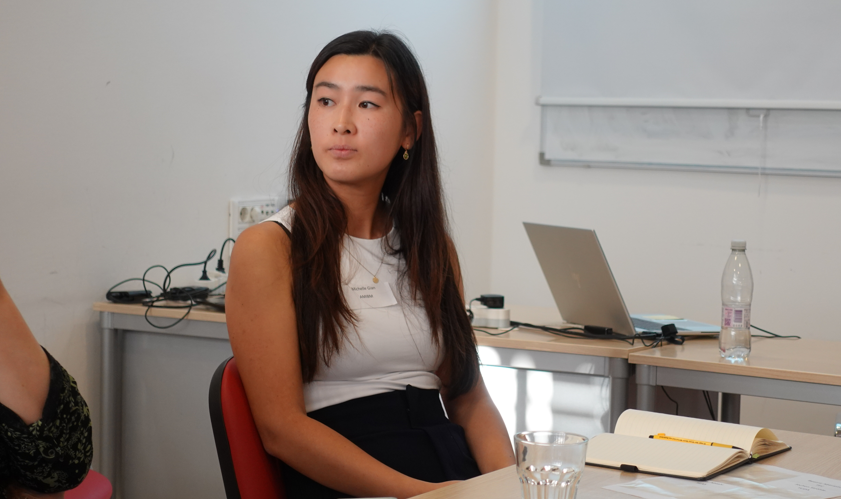
Michelle Gian is a PhD researcher at the Aachen-Maastricht Institute for Biobased Materials (AMIBM), with a bachelor’s degree in Applied Science specializing in Material Science from Fontys University of Applied Sciences and a master’s degree in Biobased Materials specializing in sustainability assessment from Maastricht University. Before joining AMIBM, she worked for a company specializing in the Cradle to Cradle framework, advising companies on improving their product sustainability, including material health and social performance.
In the CARBIOW project, she is responsible for the social pillar and will later focus on the environmental pillar. Furthermore, she is working to connect the results from each partner in the value chain to ensure a comprehensive assessment.
“The sustainability assessment consists of three pillars: economic, environmental, and social aspects. I believe the novelty of our project lies not only in converting waste into biofuels but also in our comprehensive approach to sustainability assessment. We are investigating all three pillars to gain a thorough understanding of our novel technique’s sustainability”, she said.
Since AMIBM is at the end of the value chain, their main challenge in the CARBIOW project would be to connect all the results and streamline them for the sustainability assessment.
“In my current role, focusing on the social aspects, I am dealing with the complexities of the social life cycle assessment (SLCA) method used for the CARBIOW project. SLCA is crucial for evaluating the social impacts of a product throughout its life cycle, from raw material extraction to disposal. However, it faces several challenges that make it difficult to implement. Firstly, the method is not standardized, which leads to inconsistencies in how social impacts are assessed across different projects. Secondly, SLCA often relies on qualitative data, making it more subjective compared to the quantitative data used in environmental LCA. Moreover, unlike Environmental Life Cycle Assessment (LCA), SLCA has fewer comprehensive and universally accepted databases for characterization or impact factors. While there are some resources, such as the Social Hotspots Database, they are not as extensive or standardized. Additionally, there is limited literature on SLCA, and existing studies often use different impact methods, further complicating the process. The social assessment is not as well-developed as the techno-economic assessment (TEA) and environmental life cycle assessment (LCA)”, she stated.
Due to these challenges, it is essential for AMIBM to design their own impact method tailored specifically to the project. This custom approach will help them address the gaps and ensure a thorough and reliable social assessment for the CARBIOW project. “Furthermore, we are working to connect the results from each partner in the value chain to ensure a comprehensive sustainability assessment”, she said.
When it comes to explain the main added value of the CARBIOW project in terms of the value chain approach, Michelle Gian thinks it would be its comprehensive sustainability assessment, which covers economic, environmental, and social aspects.
“By converting waste into biofuels, we address both waste management and the need for sustainable fuel alternatives in the aviation and maritime industries. Our tailored impact assessment methods and the integration of results from all partners ensure a thorough and accurate evaluation. This holistic approach not only meets industry-specific sustainability goals but also contributes to the broader knowledge base with innovative methodologies”, she concluded.
Aachen-Maastricht Institute for Biobased Materials (AMIBM)
The Aachen-Maastricht Institute for Biobased Materials (AMIBM) is a European, cross-border, research institute focusing on the development of advanced biobased materials. AMIBM designs, creates and translates biobased molecules, processes and materials into applications that outperform in functionality and sustainability for better living. It is in the Netherlands and conducts innovative fundamental, applied and translational research by creating synergies between academia and industry.
The AMIBM vision is to provide the missing links between fundamental, applied and translational research in the field of biobased materials, by changing the relationship between the production of biobased materials and the value chain. This will be achieved by developing an integrated, interdisciplinary research program focusing on novel strategies to produce advanced biobased materials and chemical building blocks in a sustainable and economical manner, and to develop these novel materials into innovative products for technical and medical applications.
AMIBM has several research groups, including Sustainability of Materials, which is the one involved in CARBIOW project. They are responsible for the sustainability assessment of the CARBIOW value chain, from waste to biofuels for the aviation and maritime industries.